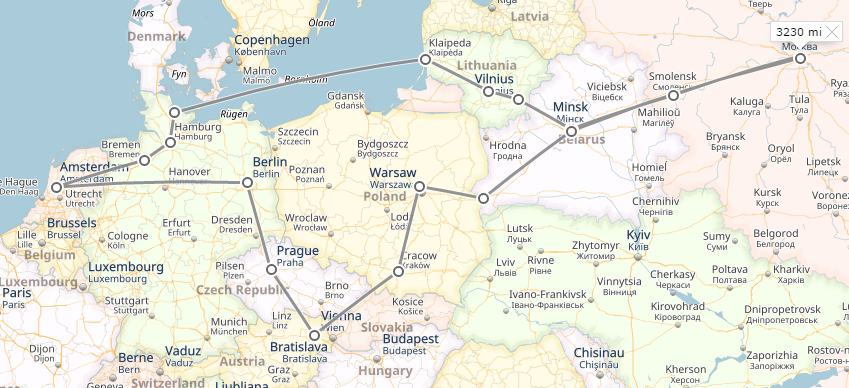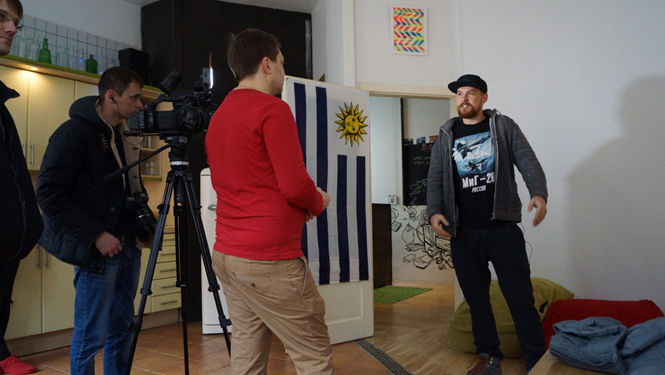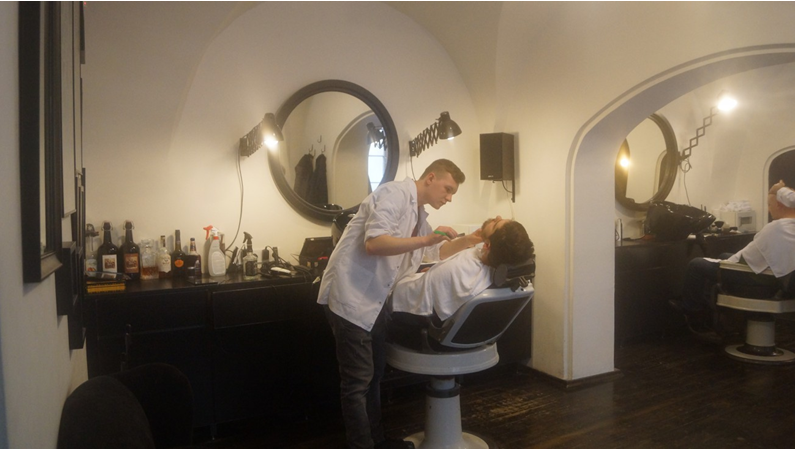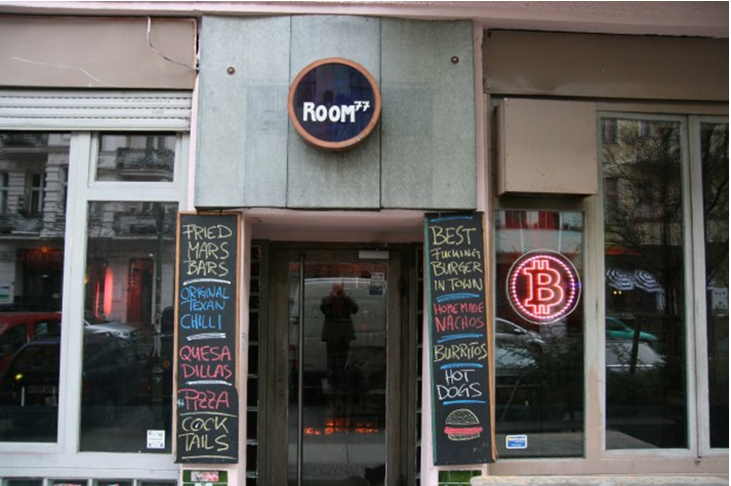Strictly speaking, we just provided our moral and financial support to it. The members of the expedition, held this year from February 26 to March 8, were journalists of the “Govorit i Pokazyvaet” production studio and BitNovosti web-site, who paid all their travel expenses only with cryptocurrency.
The tour started and finished in Moscow, and the team drove through Lithuania, Germany, Netherlands, Czech Republic, Austria, Slovakia, Poland, and Belarus. The farthermost point of the tour was the capital of Netherlands, Amsterdam. The goal of this project was to capture the current state of development of the Bitcoin infrastructure and to make a presentation at the Bitcoin Wednesday conference in Amsterdam. After that, we planned to create a new documentary film based on the travel observations of the team.

Just to remind you that at the end of the last year the first Russian documentary “Cryptocurrency: The Gold of the Digital Age” was shown. The film was created by the “Govorit i Pokazyvaet” production studio with the support of the HashFlare cloud mining service. And the presentation of the authors of this film at the conference in Amsterdam was dedicated right to the first run of this film.
It is not a new idea to travel paying in bitcoins. For example, Felix Weiss has already visited more than 22 countries, only paying in cryptocurrency everywhere. But the European experiment of the film crew and the journalists was also the first of its kind since the events of the tour were meant to be put to the basis of a new film, and the people involved in the world of cryptocurrency who were met by the film crew on their way became the central characters of the film.
If we were a bit more fortunate, we could even boast that they drank from our souvenir mugs all way long:
We were preparing our souvenir items on a very tight schedule because (as it always happens) we got started doing it at the very last moment. We spent a lot of time working with our designer until we found the solution which we were satisfied with. Then we got the print office to print everything for us within one day, and shipped a parcel with mugs, flash drives and T-shirts. But at the last second, it was detained by the customs and failed to be delivered to BitNovosti before the start of the tour. So, the expedition team started their travel having no chance to get the parcel on their way. And now we are waiting for a questionably long time when the parcel will be delivered back to us. We still haven’t received it back, though the expedition has already returned from their European tour. That’s why we can only see our mugs the way you do - on the picture :'-(
Travel Observations
We have contacted Alexander Bezzubtsev, the producer of the “Govorit i Pokazyvaet” production studio, who directly took part in the organization and realization of the Bitcoin Tour, and interviewed him on his feelings and the lessons learned.
After long preparations, a minivan stuffed with equipment and Bitcoin explorers hit the road to Belarus and Lithuania. In Minsk, the Bitcoin team was lucky to meet with the founder and CEO of SoftSwiss (www.softswiss.com) Ivan Montik. His company created the world’s first platform for Bitcoin casinos and brought classic games (slots, roulettes, cards) to the world of Bitcoin.
Searching for variants of accomodation in Belarus, the journalists and members of the film crew succeeded to find only one advertisement the author of which dared to lease the apartment for bitcoins. Except for a number of Bitcoin companies, including SoftSwiss which works for a foreign market, there is practically no Bitcoin movement in the country, and shortly the film crew moved towards the Belarusian-Lithuanian border.
As the members of the Bitcoin expedition told us later, Lithuanian border guards met them with great suspicion as the law requires everyone who enters the EU to have at least 40 Euro in cash per each day of stay, and border guards found the arguments of the journalists that they have e-wallets with bicoins in their pockets quite weak. After a long wait, our team was escorted for interrogation to the watch commander who thoroughly listened about the purpose of their journey, Bitcoin and Bitcoin Wednesday in Amsterdam for half an hour and was finally convinced by the arguments.
Unlike Belarus, in Lithuania Bitcoin is not a novelty, people know and talk about it. Staff members of some venues, whom the participants of the Bitcoin expedition met, were aware of the possibility to accept payment in cryptocurrency and, in theory, they were ready to make such transaction.

As it turned out, the owner of the cozy youth hostel was ready to accept even Litecoin. As the members of the expedition noticed, all venues which accepted bitcoins were especially creative. The Bitcoin travelers used the map of Bitcoin accepting venues for planning of their trip and land navigation, and according to their impressions this map is accurate for about 70%. In Vilnius, the Bitcoin team visited the barber shop Barzdaskuciai, owner of which likes Bitcoin. So, if you want to shave your beard and pay for it in cryptocurrency, nobody will be surprised there.

The next country of the Bitcoin tour was Germany. The first stop of the Bitcoin team in Germany was Hannover, where they met with Ricardo Ferret Rivero, the founder of the Pey company, which creates Bitcoin payment terminals and distributes them among city shops and cafes. This year, Pey is planning to launch more than 150 terminals around Hannover. And the participants of this trip informed us that now in Hannover you can quite often see the stickers “Bitcoin is accepted here” in hairdresser’s saloons, cafes and small shops.
Then the Bitcoin expedition moved to Berlin, where they visited the fabulous burger shop Room 77 which hosts the meetings of the Bitcoin community from all over the world.

By the way, the wifi password in this shop is Allyourcoinsisbelongtous!.. It is a place of meeting for people who cannot imagine their life without Bitcoin. And it is the only place in Berlin which intentionally does not accept plastic cards. The hostess of this shop says that there is no need to monitor the Bitcoin exchange rate to be informed about the status of Bitcoin. All she needs is to look at the activity of visitors of her shop.
In Prague, the participants of the expedition visited the Paralelní Polis Bitcoin venue where, among other things, they saw a real Bitcoin cashpoint and met with Bitcoin cyborgs, geeks who implanted NFC-tags under their skin and now they can pay simply by bringing their hand to the caspoint in this cafe.
The farthermost point of the tour was Amsterdam. As it turned out, in Amsterdam, there are no Bitcoin cash machines anymore. They all disappeared in unclear circumstances within one week-end. It happened four months ago. Almost all attempts to pay in bitcoins in coffeeshops, souvenir shops and grocery stores were unsuccessful: everyone knows about Bitcoin there but only few accept it. But the Bitcoin expedition did not waste their time. In Amsterdam, they visited the Bitcoin Embassy established by Marek Skachinski and made a successful presentation at the Bitcoin Wednesday conference.
According to Bezzubtsev, the participants of the Bitcoin expedition came to a conclusion: a trip around Europe for bitcoins is a feasible but yet not an easy task. Besides, so far it is impossible to go completely without fiats.
On the whole, we were a bit disappointed with the current Bitcoin infrastructure in Europe. We thought it is more well-developed. As we understood, all marks on online maps just show the willing of those venues to use Bitcoin which appeared on the crest of the fashion wave a couple of years ago. People just began to take Bitcoin more serious. It went toward smart technologies rather than just common payment means, but it will come back to the retail trade when the infrastructure will be developed.
Currently, practical use of blockchain without intermediaries remains an exotic thing, highly localized and specific, which, however, does not make any obstacles for its further development and perspectives.
These days, we are finishing the production of the first two web-format series about our Bitcoin tour, and the release of further parts is scheduled for the next month.
“We did a fundamental work. We studied the current status of Bitcoin in different countries. Usually, people write or tell something about certain aspects of it, and we have traced the system. And now, after a series of road movies, we’ve got an idea to create one more serious documentary,“ said the producer Alexander Bezzubtsev.

